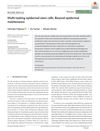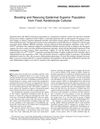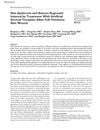
Search
for
Sort by
Research
540-570 / 655 results

research Follicular Stem Cells in Androgenetic Alopecia
Hair loss in Androgenetic Alopecia is not caused by damage to follicular stem cells.

research The Hair Follicle as a Dynamic Mini-Organ
Hair follicles are complex, dynamic mini-organs that help us understand cell growth, death, migration, and differentiation, as well as tissue regeneration and tumor biology.

research Prostaglandin D2 Inhibits Hair Growth and Is Elevated in Bald Scalp of Men with Androgenetic Alopecia
PGD2 stops hair growth and is higher in bald men with AGA.

research Mechanical and Biological Properties of Keratose Biomaterials
Keratose, derived from human hair, is a non-toxic biomaterial good for tissue regeneration and integrates well with body tissues.

research Somatic Stem Cell Heterogeneity: Diversity in the Blood, Skin, and Intestinal Stem Cell Compartments
Different types of stem cells with unique roles exist in blood, skin, and intestines, and this variety is important for tissue repair.

research dsRNA Released by Tissue Damage Activates TLR3 to Drive Skin Regeneration
Damage to skin releases dsRNA, which activates TLR3 and helps in skin and hair follicle regeneration.

research Local Circadian Clock Gates Cell Cycle Progression of Transient Amplifying Cells During Regenerative Hair Cycling
Hair grows faster in the morning and is more vulnerable to damage from radiation due to the internal clock in hair follicle cells.

research Inhibition of β-Catenin Signaling in Dermal Fibroblasts Enhances Hair Follicle Regeneration During Wound Healing
Blocking β-catenin in skin cells improves hair growth during wound healing.

research Regenerative Hair Waves in Aging Mice and Extra-Follicular Modulators Follistatin, Dkk1, and Sfrp4
Aging mice have slower hair regeneration due to changes in signal balance, but the environment, not stem cell loss, controls this, suggesting treatments could focus on environmental factors.

research Studies on the Proteome of Human Hair: Identification of Histones and Deamidated Keratins
Human hair contains diverse proteins, including keratins and histones, which could help assess hair health and aging.

research Noncoding dsRNA Induces Retinoic Acid Synthesis to Stimulate Hair Follicle Regeneration via TLR3
Noncoding dsRNA boosts hair growth by activating TLR3 and increasing retinoic acid.

research Primary Cicatricial Alopecia: Recent Advances in Understanding and Management
New understanding of the causes of primary cicatricial alopecia has led to better diagnosis and potential new treatments.

research Trichoscopy in Hair Shaft Disorders
Trichoscopy is a useful tool for diagnosing hair disorders without pulling out hair.

research Immune Modulation of Hair Follicle Regeneration
Immune cells help regulate hair growth, and better understanding this can improve hair loss treatments.

research The Hair Follicle: Functions, Self-Renewal, and Alopecic Disorders
Dogs could be good models for studying human hair growth and hair loss.

research Multi-Tasking Epidermal Stem Cells: Beyond Epidermal Maintenance
Epidermal stem cells have various roles in skin beyond just maintenance, including forming specialized structures and aiding in skin repair and regeneration.

research Use of Human Intra-Tissue Stem/Progenitor Cells and Induced Pluripotent Stem Cells for Hair Follicle Regeneration
Stem cells can help regenerate hair follicles.

research From Basal Cell Carcinoma Morphogenesis to Alopecia Induced by Hedgehog Inhibitors: Connecting the Dots
The article concludes that hair loss is a common side effect of drugs treating skin cancer by blocking the hedgehog pathway, but treatment should continue, and more selective drugs might prevent this side effect.

research Molecular Pathology of Skin Adnexal Tumors
New markers and pathways have been found in skin tumors, helping better understand and diagnose them.

research Boosting and Rescuing Epidermal Superior Population from Fresh Keratinocyte Cultures
The method increases stem-like cells for better skin regeneration.

research Comparative Proteomic Analysis in Scar-Free Skin Regeneration in Acomys Cahirinus and Scarring Mus Musculus
The African spiny mouse heals skin without scarring due to different protein activity compared to the common house mouse, which heals with scarring.

research Co-Administration of 5α-Reductase Inhibitors Worsens the Adverse Metabolic Effects of Prescribed Glucocorticoids
Taking 5α-reductase inhibitors with prednisolone can worsen its negative effects on metabolism.

research An Updated Review of the Sebaceous Gland and Its Role in Health and Diseases Part 2: Pathophysiological Clinical Disorders of Sebaceous Glands
Sebaceous glands are involved in various skin disorders, some treatable with medications like finasteride and minoxidil.

research Hypothesis: Wound-Induced TLR3 Activation Stimulates Endogenous Retinoic Acid Synthesis and Signalling During Regeneration
Activating TLR3 may help produce retinoic acid, important for tissue regeneration.

research Into the Redox Control: N-Acetyl-Cysteine Pleiotropic Effects from the Laboratory to Clinical Applications
N-acetyl-cysteine shows promise in treating various diseases and may improve skin and hair conditions, but more research is needed on dosages and long-term effects.

research Skin Epidermis and Adnexa Regrowth Induced by Treatment With Artificial Dermal Template After Full-Thickness Skin Wound
Artificial dermal template treatment can stimulate complete skin and hair follicle regrowth.

research DNA Methylation as an Epigenetic Memory Keeper During Skin Development and Regeneration
DNA methylation is essential for skin and hair follicle development, and could be a target for treating skin diseases.

research Accelerating Wound Healing Mechanisms with Cold Atmospheric Plasma
Cold atmospheric plasma may speed up wound healing and control infections.

research Integrated-Omics Profiling Unveils the Disparities of Host Defense to ECM Scaffolds During Wound Healing in Aged Individuals
Aged individuals heal wounds less effectively due to specific immune cell issues.